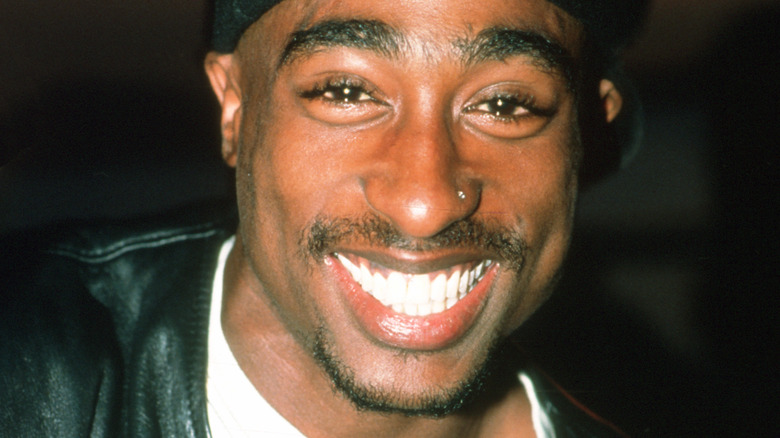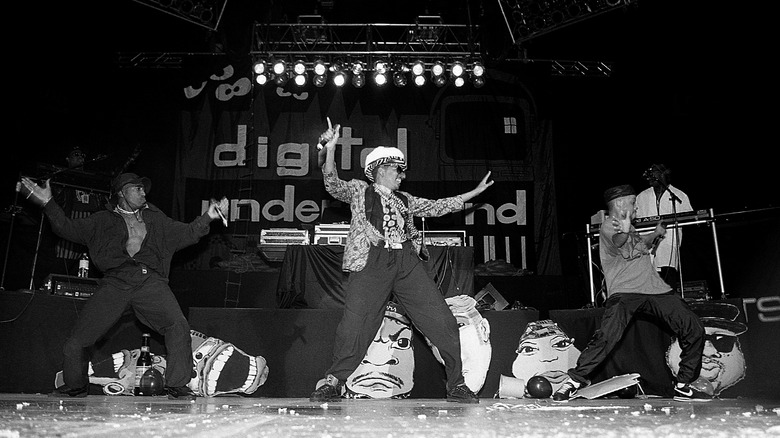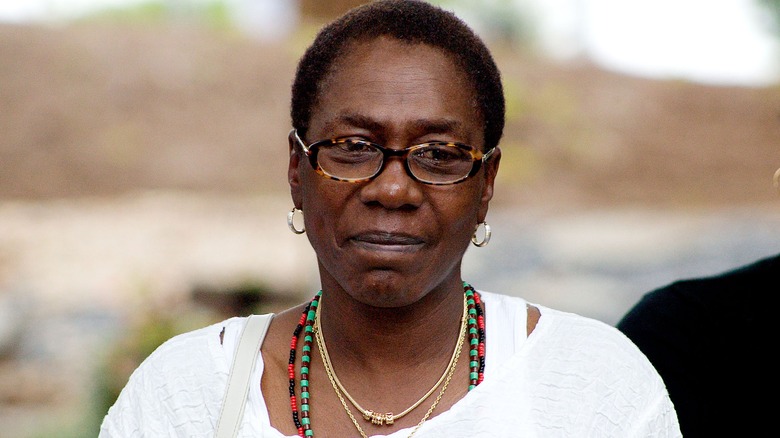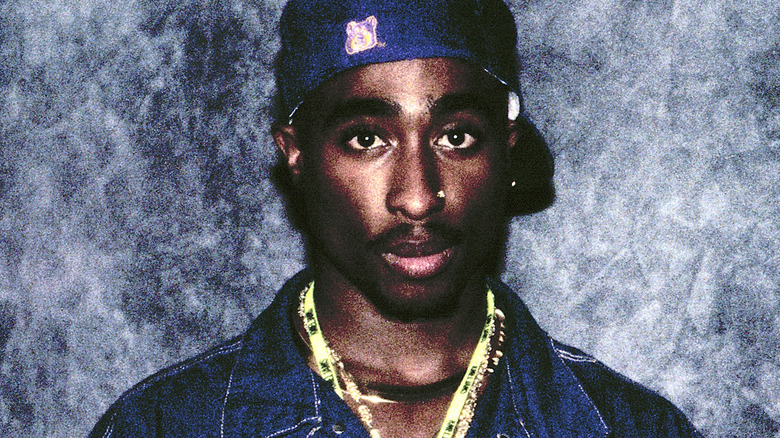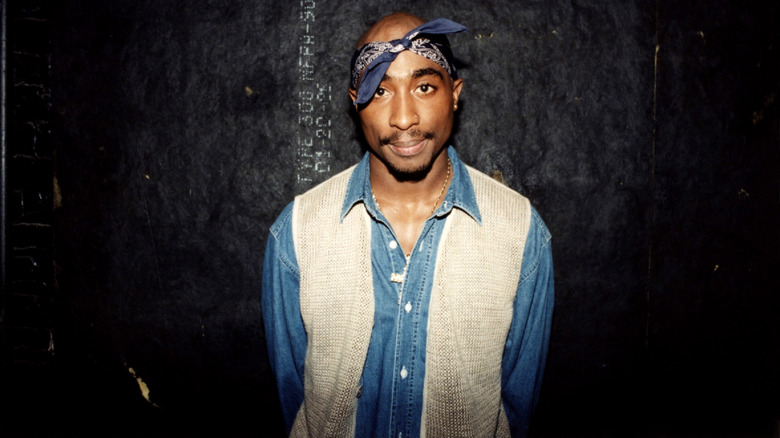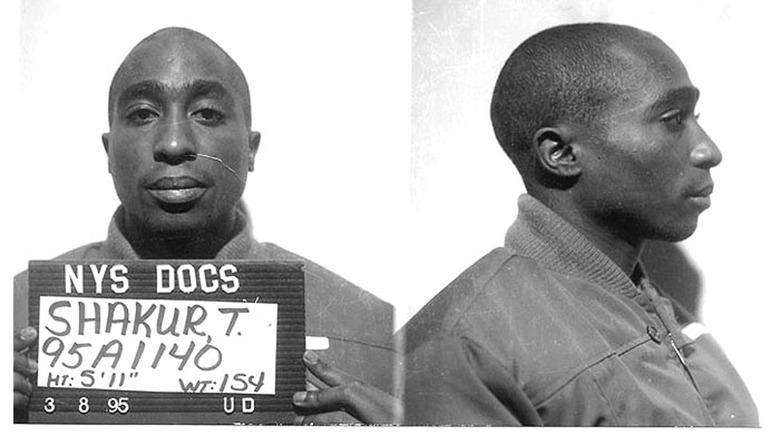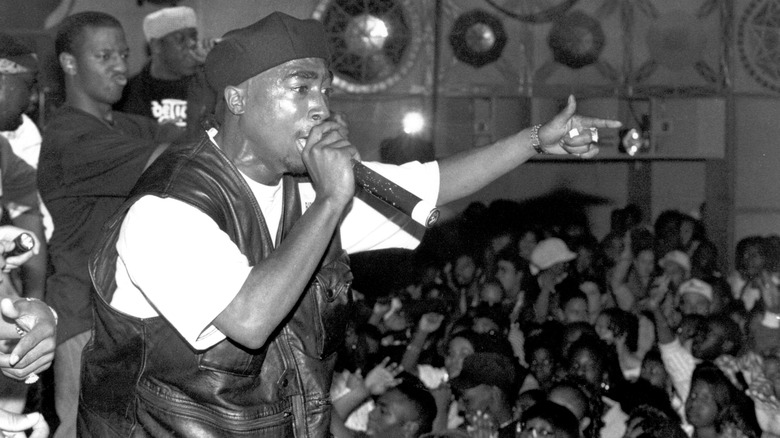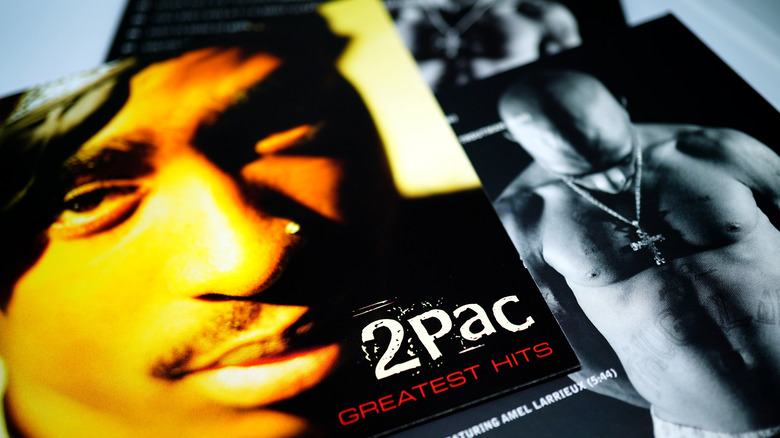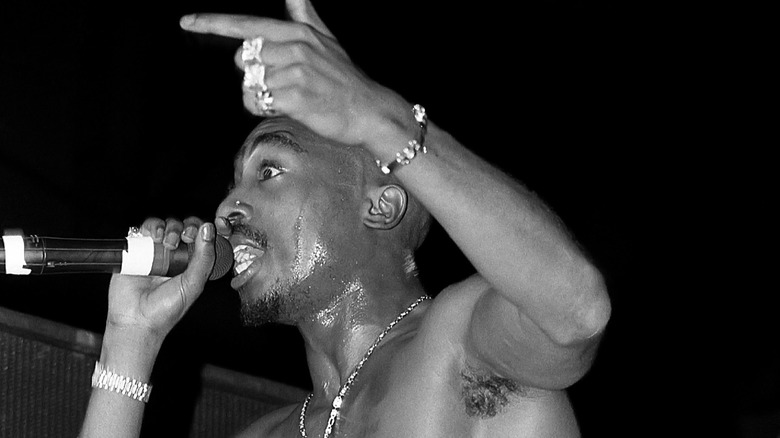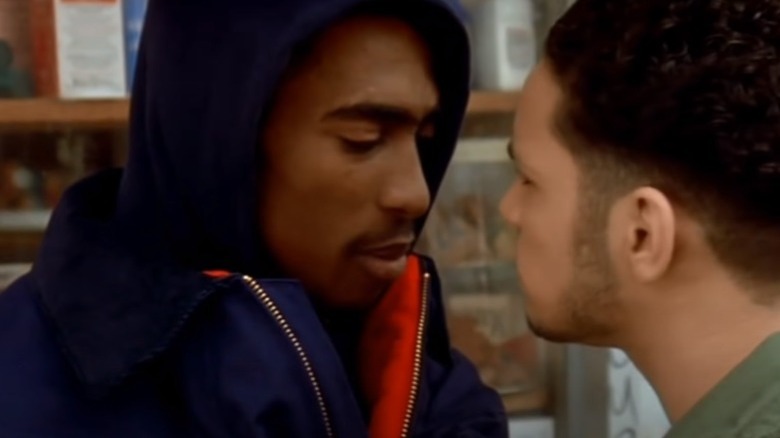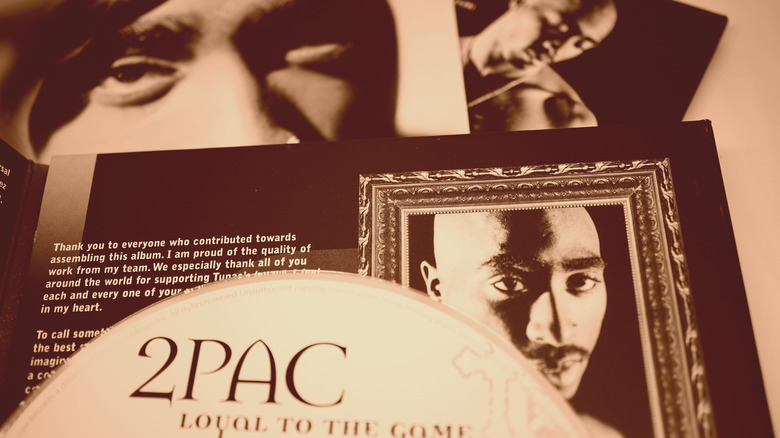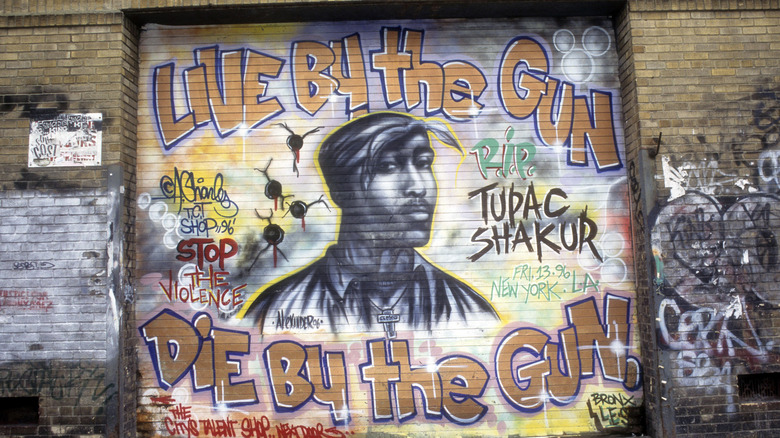Inside The Tragic Life Of Tupac Shakur
Tupac Shakur was inducted into the Rock & Roll Hall of Fame in 2017 — 21 years after his life was cut short in a still officially unsolved Las Vegas shooting. Accepting the induction on his behalf was Snoop Dogg, who said: "Pac is a part of history for a reason because he made history."
At the time of his induction, Tupac had sold more than 75 million records, per Biography. That's impressive for any artist. Considering his recording career lasted only five years, it's an astounding tribute to just how many people his music resonated with.
Just 25 years old at the time of his death, Tupac knew exactly how to reach out to an entire generation with his words and music. But at the same time, he struggled with his own demons. He once described his own lot in life: "All I'm trying to do is survive and make good out of the dirty, nasty, unbelievable lifestyle that they gave me." That's a sentiment that countless people can identify with, as we are all a product of our circumstances. So let's take a look at the tragic life that created one of the most impactful rap artists in the history of music.
Tupac grew up in an unstable situation
Tupac Shakur was born to Afeni Shakur on June 16, 1971. Vanity Fair reports that just a month prior to Tupac's birth, his mother was a part of a group of Black Panthers who were arrested and charged on 156 counts of conspiring to incite violence and a race war. Acting as her own attorney, she successfully argued their case and was acquitted after 20 minutes.
According to Vanity Fair, Tupac's sister was born two years later, and his mother struggled. Adult role models were largely absent, Tupac's godfather was in jail, and his main male role model was known around Harlem as an associate of a local drug lord. Tupac would later say this experience was "where the thug in me came from." After his mother lost her job, the family drifted and stayed in homeless shelters on their way to Baltimore, which held the promise of a new job. Tupac found some safety — and inspiration — in the Baltimore School for the Arts, but on the streets, he saw violence take the lives of those his own age. He was ridiculed relentlessly, called things like "Tuberculosis" and "Tube Sock."
But he was already writing. In 2022, Forbes reported that a booklet written and illustrated by Tupac as a preteen was going up for auction. Written for his godfather, who was in jail for an armed car robbery, it included a plea to stay strong and look ahead to days of freedom.
His mother struggled with drugs and addiction
Afeni Shakur told Vanity Fair: "My great-grandmother was a slave. My grandmother was a sharecropper. My mother was a domestic, and I was whatever the f*** I was." When acknowledging her son and his legacy, she explained, "That child changed things for all of us."
The Baltimore Sun says Tupac Shakur was 14 when his family moved to the city. Among his best friends was Gregory Schmoke, who recalled that not all memories were good. It was on one of the days when the power had been turned off that Schmoke — the mayor's son — recalled seeing Tupac's mother and a flash of light. He didn't know it at the time, but in hindsight, he realized she was smoking crack cocaine.
It was about the same time, per Vanity Fair, that her boyfriend died in prison after suffering a "crack-induced heart attack." By the time Tupac was 17, his mother had an addiction, and he started dealing. Later — when Tupac's career took off and his records started selling — friends kept his mother informed of what was going on. Everything she was told, though, went through her addiction: "I was holding on to that s*** like it was life," she said after his death. "I didn't think there was no hope for me." As for Tupac, he had a tough time coming to terms with it. Not necessarily because of the addiction, but because she had hidden it from him for so long.
If you or anyone you know is struggling with addiction issues, help is available. Visit the Substance Abuse and Mental Health Services Administration website or contact SAMHSA's National Helpline at 1-800-662-HELP (4357).
California paradise? Not so much
After New York, Baltimore was supposed to be a fresh start. It wasn't. After Baltimore, California was supposed to be a fresh start. It wasn't.
According to Vanity Fair, after a gang shooting claimed the life of a local boy in Baltimore, Afeni Shakur decided to send her son and daughter to California, at least for the summer. (Tupac Shakur, says The Baltimore Sun, was so distraught by the fact that the boy's mother couldn't afford to bury him that he raised the money himself.) Although she had arranged for them to stay with a friend, that friend almost immediately headed to rehab, and Tupac's mother had to join her children in what would become a more permanent move. Once in Marin County, she found that it wasn't exactly the safe suburb she'd thought, but rather a less-than-spectacular square mile where the have-nots lived in the shadow of the haves.
It was there where Tupac discovered his mother's crack addiction and found himself living in an abandoned apartment building. From there, he started searching for his own way — amid dealing drugs, working a series of odd jobs, and writing. Their California paradise wasn't exactly what they had hoped.
The death of Qa'id Walker-Teal
A chance meeting with Leila Steinberg kicked off Tupac Shakur's official entry into the music industry, and a year after he started working with Digital Underground, he released his debut album, 2Pacalypse Now. That was in 1991, and in 1992, he went home to Marin City for the town's 50th anniversary festival.
It was there, according to SFGate, that he spent some time meeting and greeting fans until a fight started — allegedly sparked by comments Tupac had made about the city. A gun was pulled and fired, and a 6-year-old named Qa'id Walker-Teal — who was riding his bike nearby — was shot and killed.
It wasn't until 1995 that Deseret News reported on the settlement of the wrongful death suit: Tupac paid out an undisclosed settlement after witnesses testified that the bullet that had killed the little boy had come from Tupac's gun. The gun, testimony revealed, had been dropped and picked up by Tupac's half-brother, Maurice Harding, who then started shooting.
After Tupac's death a year after the settlement, a friend of his mother's described how heartbroken he had been over the entire incident, telling Vanity Fair: "Tupac cried and cried when he called to tell me about that little boy," Watani Tchyemba explained. "You couldn't console him."
Tupac's sexual assault case
In 1995, The New York Times reported that Tupac Shakur had been sentenced to jail for sexual assault. At the same time he apologized to his accuser for anything she may have suffered, he also denied that he had committed any crimes.
The accusations were anything but straightforward and in 2018, accuser Ayanna Jackson recounted what happened in a VladTV interview. She claimed that she — having already had a sexual relationship with Tupac — had been invited to his New York hotel room. There, she said, three others walked into the room and she was sexually assaulted by multiple people.
The conviction and sentence would famously open the door for his relationship with Suge Knight and Death Row Records. In an excerpt from "Changes: An Oral History of Tupac Shakur," by Sheldon Pearce, Los Angeles Magazine quoted former Death Row head of business affairs Alex Roberts' opinion on whether Tupac was innocent of the assault charges: "From my lips to God's ears, yes. Why? My experience with him. How polite he was."
If you or anyone you know has been a victim of sexual assault, help is available. Visit the Rape, Abuse & Incest National Network website or contact RAINN's National Helpline at 1-800-656-HOPE (4673).
A 1994 shooting and its statute of limitations
The Washington Post report in 1994 was pretty shocking: Tupac Shakur, while waiting for a verdict in his sexual assault trial, was shot five times as he entered Quad Recording Studios in Times Square. The three assailants then stole around $45,000 worth of property and fled. Tupac's camp quickly came forward with claims that someone had targeted him in more than just a mugging, while law enforcement said it was simply that — another mugging — and nothing more.
Fast forward to 2011, and new information surfaced that suggested Tupac was right.
According to The Guardian, it started with a confession from a man named Dexter Isaac. He claimed that he had been hired by Jimmy "Henchman" Rosemond to carry out the robbery and that he was paid $2,500 and whatever he could steal from Tupac and his friends (minus one particular ring Henchman called dibs on).
While that may have laid to rest a major unsolved crime in Tupac's history, it came with a heavy dose of bitterness: As the statute of limitations had long expired, no one will ever be charged.
Tupac and his father both regretted not knowing each other better
In 2011, XXL interviewed Tupac Shakur's father, Billy Garland. Garland had been active in the Black Panther Party at the same time as Afeni Shakur, and although he lived near her in the early part of the 1970s, they lost touch until 1994.
That, says Vanity Fair, is when Tupac was in the hospital recovering from gunshot wounds, and Garland went to visit him. Garland had seen Tupac on a poster, and as soon as they met face-to-face, the uncanny likeness left no doubts that they were father and son. Tupac once described the moment: "Right then, I thought I had died and gone to Heaven."
Circumstances kept them from building the father-son relationship that they both wanted, and 15 years after Tupac's death, Garland's XXL interview made it clear how he felt. "There's no doubt in my mind that I could've been a better father. There's no doubt. I have to bear the burden of that because maybe there was something I could have said or have done, maybe, that might not have led to the path that his life has led to."
Garland attempted to snatch some of Tupac Shakur's money after he died. According to the Los Angeles Times, a DNA test confirmed that Garland was his father, but his claim to half Tupac's estate was denied on the basis of minimal contact between the two and Garland's lack of contributions to his upbringing.
Tupac's relationship with Madonna ended for a heartbreaking reason
InStyle described Tupac Shakur and Madonna as a "music power couple," but here's the thing: It wasn't until 2015 that Madonna even confirmed that they had been a serious pair. Rumors had swirled, of course, but rumors are just that — rumors.
It turns out that these had been true. The story goes that Rosie Perez set the two up at the 1993 Soul Train Music Awards, and the relationship that followed was largely out of the public eye. Rumors that they had recorded a song together weren't confirmed until 2018 when she posted a promise on Instagram that "One day I will release the song we did together!"
Exactly what happened between the pair remained something of a mystery, and it wasn't until 2019 that Rolling Stone reported on the existence of a letter that shed some light on the whole thing. Madonna was, at the time, trying to stop the letter from being sold at auction.
The 1995 letter included a reference to a remark he'd found troubling: "An interview where you said 'I'm off to rehabilitate all the rappers & basketball players' or something to that effect those words cut me deep seeing how I had never known you to be with any rappers besides myself." He continued: "It was at this moment out of hurt & and a natural instinct to strike back and defend my heart & ego that I said a lot of things."
Tupac's movie career was cut too short
In 1992, Tupac Shakur starred in "Juice," which earned him some serious praise for this portrayal of Bishop, according to Rotten Tomatoes. It was the first of a few movie roles, and as Tupac explained not long before his death via Biography: "I could be the best actor anybody's ever seen, given the chance, the opportunity, and the experience and the lessons from people. I could be the best, but right now, I don't even wish to be the best, I just want to be one of them."
Sadly, he would star in far too few movies, with opportunities disappearing before his life was cut short. Originally cast in 1993's "Menace II Society," he was famously fired after coming to blows with the film's director, Allen Hughes. Still, Hughes later told MTV that if Tupac had been in the film, "He would've outshined everyone" and that "he was bigger than the movie."
He was also set to star in 1995's "Higher Learning," but according to Vanity Fair, Columbia informed director John Singleton that Shakur needed to be fired because of the sexual assault charges filed against him. It was a bitter pill to swallow considering Singleton later said (via Vibe) that he hadn't just cast Tupac, he had written the film specifically for him: "Pac ended up getting in trouble, and then all that stuff happened in New York. It was logistically impossible."
He started questioning his royalties
It might seem like Tupac Shakur's bank account would be bursting with his rapid rise to fame. Biography says that absolutely wasn't the case — and by mid-1996, he was starting to question the powers that be at Death Row about his royalties. At the time, his album sales alone had topped $60 million, but according to his bottom line, he was in debt to the record company to the tune of $4.9 million.
In an excerpt from Sheldon Pearce's "Changes: An Oral History of Tupac Shakur" (via Los Angeles Magazine), videographer Gobi Rahimi said he had overheard Suge Knight and Tupac arguing about money: "I'm selling millions of albums, and you're giving me pennies," Rahimi recalled Tupac saying.
Although Tupac remained a Death Row artist publicly, those who knew him said that there were signs that he was planning on going elsewhere. Rap Coalition Founder Wendy Day said that he knew that people were cheating him, but that his powerful sense of loyalty made it hard for him to advocate for himself. "They were there for him in the beginning when he had nothing, so even though he knew they were stealing from him, he wasn't going to do anything because he felt a sense of loyalty," Day explained.
Still, once he fulfilled his three-album deal, Day said he stopped wearing Death Row gear within the last 12 months of his life.
Tupac died at 25 years old
The events leading up to the tragic murder of Tupac Shakur in 1996 are incredibly complicated and, per History, involve accusations that started the East vs. West Coast feud during that era. We still don't know many details, but what is known is that after a boxing match at the MGM Grand hotel in Las Vegas, Tupac got into a fight with a man named Orlando Anderson who was later identified as having ties with the Crips. Hours later, he was shot while sitting in his car at a light on Flamingo Road. He died several days later.
KTNV Las Vegas reported that police still believed Anderson was the prime suspect. Suge Knight was one of the witnesses to Tupac's murder and years later, Anderson's uncle reportedly confessed he had supplied the murder weapon as part of a deal to gain immunity. Since Anderson was already dead, the number of people who might be prosecuted was suddenly non-existent.
When Vanity Fair spoke with Afeni Shakur the year after her son's death, she said she spent much of her time listening to the song he had written for her: "Dear Mama." When she'd gotten the call, she said she hadn't been surprised. "From the moment he was born, I measured his life in five-year periods," she said. "Fifteen, 20, 25, I was always amazed he'd survived. He was a gift."
